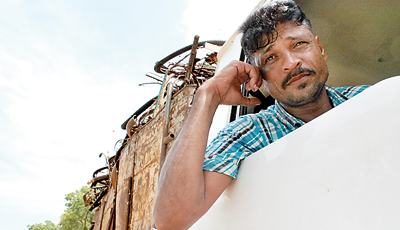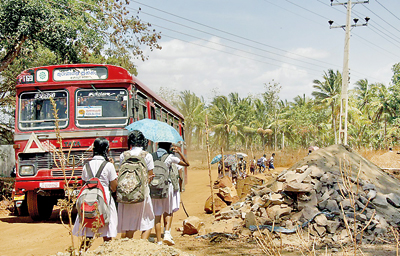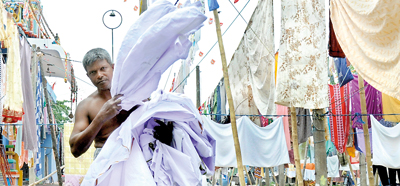News
Striking while the iron is hot
Names such as Mullivaikal, Puthumathalan and Ampalavan Pokkanai would be unknown to most but for the fact that they were scenes of battle in 2009, during the last phase of the war. The three villages are in the northern district of Mullaitivu.

Scrap iron from abandoned and rusted bicycles has value for poor Vanni families. Pix by T. Premanath
When the war ended, the residents of these villages were taken to government welfare centres. It was only recently that they were permitted to return and resume life in the areas where they have spent their entire lives. Agriculture and fishing are the main occupations.
Following resettlement, the resumption of agriculture is at the early stages. Fishing is a potential source of income, but none of the villagers possess the equipment necessary to engage in the trade.
Government officials say they are taking measures to supply the needs of the people, and have appealed to TNA MPs who recently visited the villages.
Things are changing now, as the collection and sale of rusted iron has become the major income earner.
During the final days of the war, about 300,000 people were trapped in this limited land area, along with their vehicles and belongings. Most of them had to abandon their goods, including their bicycles.
During the war, bicycles were the primary mode of transport, not only in the villages of the North but also in the towns. A couple of hundred thousand bicycles were in use. Each home had at least one bicycle, and some homes had up to five.
During the three-year resettlement period, these bicycles were open to the elements and over time rusted. The same happened to iron and aluminium utensils. Much of the abandoned materials bear the marks of battle. This is the desolate and depressing scene visitors to Mullivaikal will witness.
Collecting ironware and selling the pieces to traders from different parts of the country, mostly from the South, has become the primary income of the people here.
According to Mr. Appan, a resident of Pokkanai, the people here were engaged in agriculture and had jobs when the LTTE were in charge. As there are no jobs available now, they have taken up the scrap iron trade. Had Mr. Appan gone to Jaffna, he could have found a job as a mason. For now, he manages with what he earns from selling old iron. He works with two others.
Traders pay between Rs. 25 and Rs. 40 for a kilo of scrap iron, the rate depending on the condition of the iron. Aluminium and iron utensils go for Rs. 35 a kilo.
The Puthumathalan junction has become a minor old-iron market, attracting traders from Puttalam and Polonnaruwa. Three generations from one Mullaitivu family – represented by a son, mother, and grandmother – earned Rs. 1,200 in a morning of trading.

Traders are cashing in on leftovers from the war in the North
Vanita and her son collect the old iron and her mother sells the iron. “No jobs,” Vanithakumari said. “This is our only source of income. There is no male wage earner in the family. This is the best we can do.”
The male members of the majority of families here were killed during the conflict.
Young males of school-going age would rather collect old iron than go to school. A teenager who can collect 35 kilos of iron can make Rs. 1,000 in a day. A teacher in Ampalavan Pokkanai says school attendance has dropped.
Trader K. Fysal says the profit margin in the old iron trade is small. “We made good profits earlier.”
Permission from the security forces is required to remove old iron from the North. Last month, a trader was caught trying to smuggle seven vehicle engines out of Omanthai.
Every day thousands of kilos of iron are removed from the North – iron that was once the property of the Wanni people.
Follow @timesonlinelk
comments powered by Disqus























